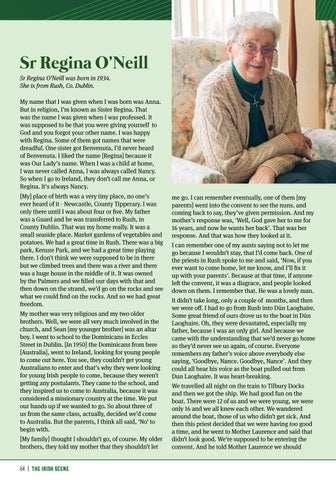Sr Regina O’Neill Sr Regina O’Neill was born in 1934. She is from Rush, Co. Dublin.
My name that I was given when I was born was Anna. But in religion, I’m known as Sister Regina. That was the name I was given when I was professed. It was supposed to be that you were giving yourself to God and you forgot your other name. I was happy with Regina. Some of them got names that were dreadful. One sister got Benvenuta, I’d never heard of Benvenuta. I liked the name [Regina] because it was Our Lady’s name. When I was a child at home, I was never called Anna, I was always called Nancy. So when I go to Ireland, they don’t call me Anna, or Regina. It’s always Nancy. [My] place of birth was a very tiny place, no one’s ever heard of it - Newcastle, County Tipperary. I was only there until I was about four or five. My father was a Guard and he was transferred to Rush, in County Dublin. That was my home really. It was a small seaside place. Market gardens of vegetables and potatoes. We had a great time in Rush. There was a big park, Kenure Park, and we had a great time playing there. I don’t think we were supposed to be in there but we climbed trees and there was a river and there was a huge house in the middle of it. It was owned by the Palmers and we filled our days with that and then down on the strand, we’d go on the rocks and see what we could find on the rocks. And so we had great freedom. My mother was very religious and my two older brothers. Well, we were all very much involved in the church, and Sean [my younger brother] was an altar boy. I went to school to the Dominicans in Eccles Street in Dublin. [In 1950] the Dominicans from here [Australia], went to Ireland, looking for young people to come out here. You see, they couldn’t get young Australians to enter and that’s why they were looking for young Irish people to come, because they weren’t getting any postulants. They came to the school, and they inspired us to come to Australia, because it was considered a missionary country at the time. We put our hands up if we wanted to go. So about three of us from the same class, actually, decided we’d come to Australia. But the parents, I think all said, ‘No’ to begin with. [My family] thought I shouldn’t go, of course. My older brothers, they told my mother that they shouldn’t let
64 | THE IRISH SCENE
me go. I can remember eventually, one of them [my parents] went into the convent to see the nuns, and coming back to say, they’ve given permission. And my mother’s response was, ‘Well, God gave her to me for 16 years, and now he wants her back’. That was her response. And that was how they looked at it. I can remember one of my aunts saying not to let me go because I wouldn’t stay, that I’d come back. One of the priests in Rush spoke to me and said, ‘Now, if you ever want to come home, let me know, and I’ll fix it up with your parents’. Because at that time, if anyone left the convent, it was a disgrace, and people looked down on them. I remember that. He was a lovely man. It didn’t take long, only a couple of months, and then we were off. I had to go from Rush into Dún Laoghaire. Some great friend of ours drove us to the boat in Dún Laoghaire. Oh, they were devastated, especially my father, because I was an only girl. And because we came with the understanding that we’d never go home so they’d never see us again, of course. Everyone remembers my father’s voice above everybody else saying, ‘Goodbye, Nance. Goodbye, Nance’. And they could all hear his voice as the boat pulled out from Dun Laoghaire. It was heart-breaking. We travelled all night on the train to Tilbury Docks and then we got the ship. We had good fun on the boat. There were 12 of us and we were young, we were only 16 and we all knew each other. We wandered around the boat, those of us who didn’t get sick. And then this priest decided that we were having too good a time, and he went to Mother Laurence and said that didn’t look good. We’re supposed to be entering the convent. And he told Mother Laurence we should




























